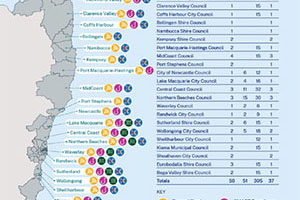Sustainability
- Home
- Locations
- What you can do
- LiFE Framework
- Sustainable Development Goals
- About us
- Grants
- Events
- Contact us
Now searching for:

Collaborative research from Charles Sturt University and NSW Department of Primary Industries Fisheries (DPI) works toward determining and adapting its Shark Management Strategy. Traditionally a policy area driven by technical and ecological expertise, the DPI has purposefully increased its attention to the needs and expectations of all NSW communities, especially beach and ocean users along the coast, allowing it to differentiate approaches and communicate effectively with different communities. It used more than 35 focus groups and surveys of beach and ocean users (surfers, anglers, tourism, small business, councils, conservation, etc.) along the NSW coast. Charles Sturt developed new research tools for listening to communities.
The main users of the research were officials and policymakers involved in the NSW Department of Primary Industries, but the research has also helped councils and shark harm mitigation efforts across the nation. The findings from the research have been published in international marine policy and scholarly journals and presented at peak industry and international environmental communication forums.
The program consistently found general preference for less invasive approaches to managing sharks over killing and culling, and support for approaches enabled by newer technologies.
The research and consequent policy changes have impacted coastal communities in several important ways. With improvements to surveillance and detection, humans en masse feel sufficiently secure to continue enjoying the ocean for recreation. In contributing to understanding of community preferences for less-invasive approaches to managing sharks, the consequent policy helps to preserve the marine environment and reduce the death and suffering of marine life caused by traditional approaches.
Find out more about
Shark management plans